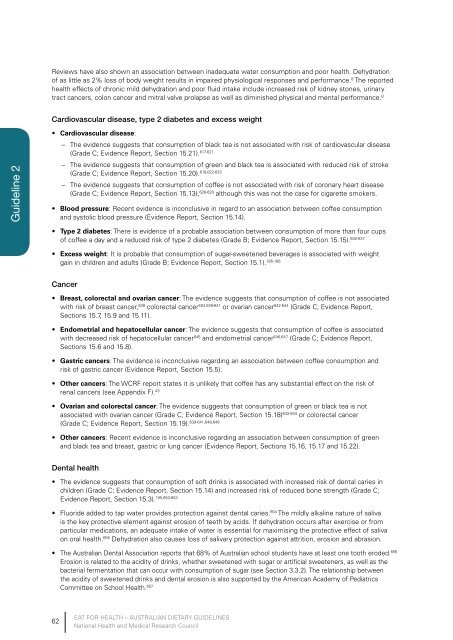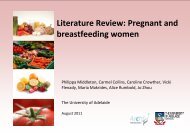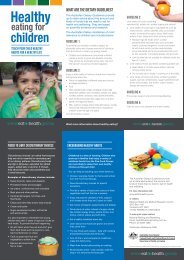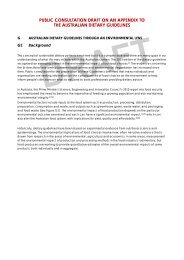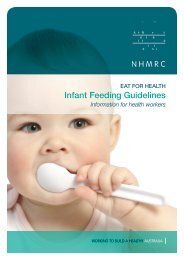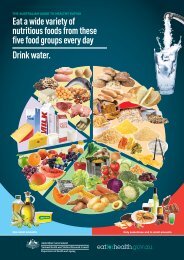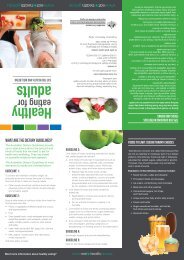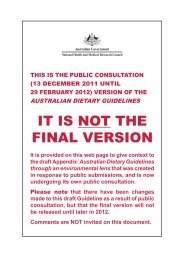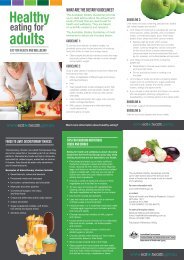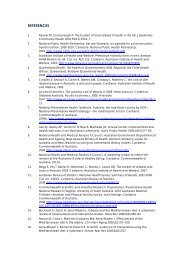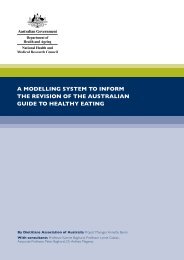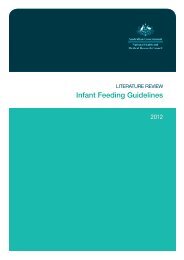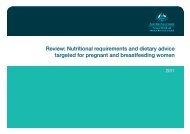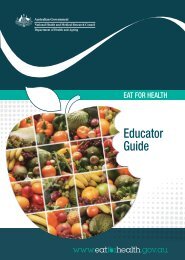Guidelines Dietary - Eat For Health
Guidelines Dietary - Eat For Health
Guidelines Dietary - Eat For Health
- No tags were found...
Create successful ePaper yourself
Turn your PDF publications into a flip-book with our unique Google optimized e-Paper software.
Reviews have also shown an association between inadequate water consumption and poor health. Dehydrationof as little as 2% loss of body weight results in impaired physiological responses and performance. 8 The reportedhealth effects of chronic mild dehydration and poor fluid intake include increased risk of kidney stones, urinarytract cancers, colon cancer and mitral valve prolapse as well as diminished physical and mental performance. 8Cardiovascular disease, type 2 diabetes and excess weightGuideline 2• Cardiovascular disease:––The evidence suggests that consumption of black tea is not associated with risk of cardiovascular disease(Grade C; Evidence Report, Section 15.21). 617-621––The evidence suggests that consumption of green and black tea is associated with reduced risk of stroke(Grade C; Evidence Report, Section 15.20). 619,622-625––The evidence suggests that consumption of coffee is not associated with risk of coronary heart disease(Grade C; Evidence Report, Section 15.13), 626-629 although this was not the case for cigarette smokers.• Blood pressure: Recent evidence is inconclusive in regard to an association between coffee consumptionand systolic blood pressure (Evidence Report, Section 15.14).• Type 2 diabetes: There is evidence of a probable association between consumption of more than four cupsof coffee a day and a reduced risk of type 2 diabetes (Grade B; Evidence Report, Section 15.15). 630-637• Excess weight: It is probable that consumption of sugar-sweetened beverages is associated with weightgain in children and adults (Grade B; Evidence Report, Section 15.1). 185-196Cancer• Breast, colorectal and ovarian cancer: The evidence suggests that consumption of coffee is not associatedwith risk of breast cancer, 638 colorectal cancer 494,639-641 or ovarian cancer 642-644 (Grade C; Evidence Report,Sections 15.7, 15.9 and 15.11).• Endometrial and hepatocellular cancer: The evidence suggests that consumption of coffee is associatedwith decreased risk of hepatocellular cancer 645 and endometrial cancer 646,647 (Grade C; Evidence Report,Sections 15.6 and 15.8).• Gastric cancers: The evidence is inconclusive regarding an association between coffee consumption andrisk of gastric cancer (Evidence Report, Section 15.5).• Other cancers: The WCRF report states it is unlikely that coffee has any substantial effect on the risk ofrenal cancers (see Appendix F). 43• Ovarian and colorectal cancer: The evidence suggests that consumption of green or black tea is notassociated with ovarian cancer (Grade C; Evidence Report, Section 15.18) 642-644 or colorectal cancer(Grade C; Evidence Report, Section 15.19). 639-641,648,649• Other cancers: Recent evidence is inconclusive regarding an association between consumption of greenand black tea and breast, gastric or lung cancer (Evidence Report, Sections 15.16, 15.17 and 15.22).Dental health• The evidence suggests that consumption of soft drinks is associated with increased risk of dental caries inchildren (Grade C; Evidence Report, Section 15.14) and increased risk of reduced bone strength (Grade C;Evidence Report, Section 15.3). 195,650-653• Fluoride added to tap water provides protection against dental caries. 654 The mildly alkaline nature of salivais the key protective element against erosion of teeth by acids. If dehydration occurs after exercise or fromparticular medications, an adequate intake of water is essential for maximising the protective effect of salivaon oral health. 655 Dehydration also causes loss of salivary protection against attrition, erosion and abrasion.• The Australian Dental Association reports that 68% of Australian school students have at least one tooth eroded. 656Erosion is related to the acidity of drinks, whether sweetened with sugar or artificial sweeteners, as well as thebacterial fermentation that can occur with consumption of sugar (see Section 3.3.2). The relationship betweenthe acidity of sweetened drinks and dental erosion is also supported by the American Academy of PediatricsCommittee on School <strong>Health</strong>. 65762EAT FOR HEALTH – australian dietary guidelinesNational <strong>Health</strong> and Medical Research Council


